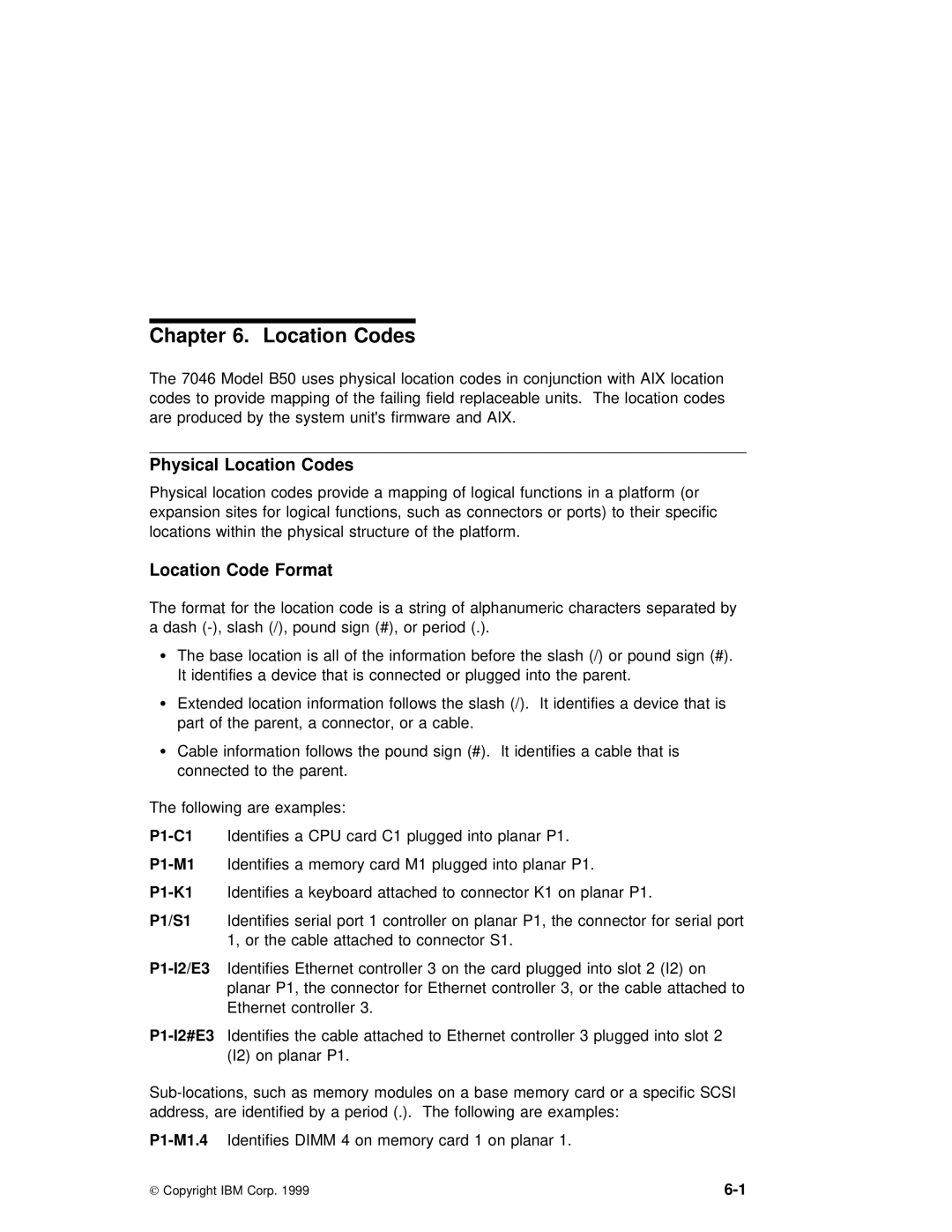Chapter 6. | Location Codes |
|
|
|
|
|
|
|
|
|
|
|
|
|
|
|
|
|
|
|
|
|
| ||||
The | 7046 | Model B50 uses physical location codes | in conjunction with AIX location |
| |||||||||||||||||||||||
codes to provide mapping of | the | failing | field | replaceable units. The location cod | |||||||||||||||||||||||
are produced by the system unit's | firmware | and | AIX. |
|
|
|
|
|
|
|
|
|
| ||||||||||||||
|
|
|
|
|
|
|
|
|
|
|
|
|
|
|
|
|
|
|
|
|
|
|
|
|
| ||
Physical | Location | Codes |
|
|
|
|
|
|
|
|
|
|
|
|
|
|
|
|
|
|
|
|
|
|
| ||
Physical | location codes provide a mapping | of | logical functions | in | a | platform | (or |
| |||||||||||||||||||
expansion | sites | for | logical | functions, | such | as | connectors | or | ports) | to | their | speci | |||||||||||||||
locations | within the physical structure of | the | platform. |
|
|
|
|
|
|
|
|
|
| ||||||||||||||
Location | Code | Format |
|
|
|
|
|
|
|
|
|
|
|
|
|
|
|
|
|
|
|
|
|
|
| ||
The | format for | the | location |
| code | is | a | string | of | alphanumeric | characters | separat | |||||||||||||||
a | dash | slash | (/), | pound | sign | (#), | or | period | (.). |
|
|
|
|
|
|
|
|
|
| ||||||||
Ÿ | The | base | location | is | all |
| of the | information | before the | slash | (/) | or | pound | si | |||||||||||||
| It | identifies | a | device |
| that | is | connected | or | plugged | into the | parent. |
|
| |||||||||||||
Ÿ Extended location information follows | the | slash | (/). It | identifies | a | device | tha | ||||||||||||||||||||
| part | of | the | parent, | a | connector, | or | a cable. |
|
|
|
|
|
|
|
|
|
|
| ||||||||
ŸCable information follows the pound sign (#). It identifies a cable that is connected to the parent.
The following | are | examples: |
|
|
|
|
|
|
|
|
|
|
|
| ||||
| Identifies | a | CPU | card C1 | plugged | into | planar | P1. |
|
|
|
| ||||||
| Identifies | a | memory | card | M1 | plugged into planar | P1. |
|
|
|
| |||||||
| Identifies | a keyboard attached to connector | K1 | on | planar | P1. |
|
| ||||||||||
P1/S1 | Identifies | serial port 1 controller on planar | P1, | the | connector | for seria | ||||||||||||
| 1, | or | the | cable attached to connector S1. |
|
|
|
|
|
| ||||||||
| Identifies | Ethernet | controller | 3 on | the | card | plugged | into | slot | 2 | (I2) o | |||||||
| planar | P1, | the connector for Ethernet controller | 3, | or | the | cable | attached | ||||||||||
| Ethernet | controller | 3. |
|
|
|
|
|
|
|
|
|
|
| ||||
Copyright IBM Corp. 1999 |
